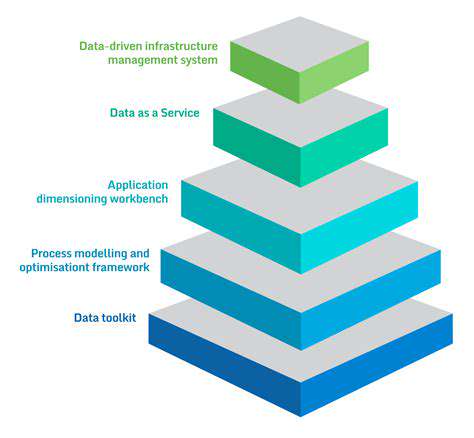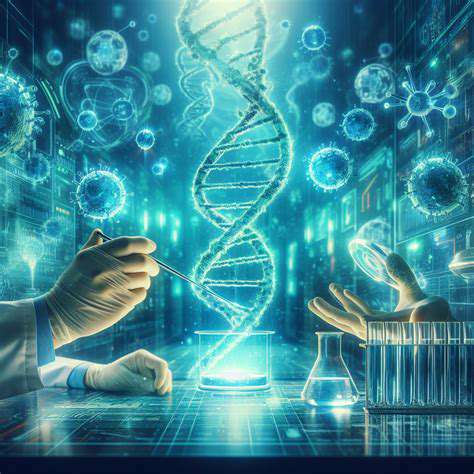Early Conceptualizations and the Dawn of Synthetic Biology
The seeds of synthetic biology were sown long before the technology itself materialized. Philosophical explorations of artificial life, from ancient myths to modern science fiction, laid the groundwork for the concept. These early musings, while not grounded in the practicalities of molecular manipulation, explored the fundamental questions about the nature of life and the possibility of creating it. The very act of imagining such a thing sparked curiosity and fueled the desire to understand the intricate mechanisms that govern biological systems. This intellectual history provided a fertile ground for the scientific advancements that would eventually lead to the field of synthetic biology.
Early scientific breakthroughs, particularly in understanding DNA structure and function, significantly advanced the potential for manipulating and creating biological systems. The discovery of the double helix in the 1950s revolutionized our understanding of heredity and paved the way for targeted genetic interventions. These advancements, combined with burgeoning technological capabilities, created a critical mass of knowledge and tools that ultimately allowed for the development of synthetic biology as a distinct field of study. The ability to isolate, analyze, and manipulate DNA fragments opened up exciting possibilities for re-engineering biological processes.
The Rise of Genetic Engineering and the First Synthetic Organisms
The development of genetic engineering techniques, such as polymerase chain reaction (PCR) and recombinant DNA technology, were pivotal in the genesis of synthetic biology. These tools allowed scientists to precisely manipulate DNA, isolate specific genes, and insert them into different organisms. This capability opened up a new realm of possibilities, enabling researchers to modify existing organisms or create entirely new ones with tailored functionalities. The first synthetic organisms, while rudimentary compared to modern constructs, marked a significant milestone in the field, showcasing the potential for engineering life at a fundamental level. The ability to synthesize and introduce specific genetic code demonstrated the potential to control biological processes in ways never before imaginable.
These initial experiments focused heavily on understanding the basic building blocks of life and the mechanisms by which they interacted. Creating simple synthetic genetic circuits, like those that could respond to external stimuli, allowed for a proof-of-concept in the field. These early successes fueled further research and development, leading to more sophisticated and complex synthetic systems. The initial work laid the foundation for future advancements in the field, fostering a growing sense of excitement and anticipation for the potential applications of this new technology.
The Exponential Growth and Diverse Applications of Synthetic Biology
The field of synthetic biology has experienced exponential growth in recent years, driven by advancements in DNA synthesis, gene editing technologies like CRISPR, and increased computational power. The ability to design and synthesize complex genetic circuits has led to a wide range of potential applications, ranging from biofuels production to drug development and environmental remediation. The development of sophisticated tools and techniques has enabled scientists to create organisms with customized functionalities, opening up a vast array of possibilities for improving human lives and addressing global challenges. The growing capabilities of synthetic biology have led to a surge in research and development across diverse sectors.
Synthetic biology holds significant promise for tackling global challenges such as climate change and food security. The potential for creating organisms that produce biofuels or capture carbon dioxide from the atmosphere is enormous. In addition, the ability to engineer microbes for producing valuable pharmaceuticals or biomaterials has far-reaching implications. These possibilities, combined with the increasing accessibility of synthetic biology tools and techniques, are poised to transform various industries and shape the future of life sciences.
Ethical Considerations and the Future of Synthetic Biology
The rapid advancement of synthetic biology raises critical ethical considerations that must be carefully addressed. The ability to create new life forms necessitates a thorough evaluation of potential risks and benefits, particularly in terms of unintended consequences and ecological impacts. Open discussions and collaborations among scientists, ethicists, policymakers, and the public are crucial to navigate the ethical landscape of this transformative technology. The potential for misuse and the need for responsible development must be carefully considered to ensure that synthetic biology is used for the betterment of humanity.
The future of synthetic biology hinges on a careful balance between innovation and ethical responsibility. Ensuring that this powerful technology is used for the benefit of all requires proactive measures to address potential risks and promote responsible innovation. Ongoing dialogue and collaboration among scientists, ethicists, policymakers, and the public will be critical in shaping the future trajectory of synthetic biology, ensuring that it is developed and deployed in a manner that is safe, equitable, and beneficial for society as a whole. Transparency and public engagement are essential to building trust and fostering responsible innovation.
Beyond the Laboratory: Societal Impacts and Responsibilities

Beyond the Laboratory: Societal Impacts of Biotechnology
Biotechnology, while often confined to the sterile environment of laboratories, has profound and far-reaching impacts on society. Its applications extend far beyond the realm of scientific research, affecting everything from food production and healthcare to environmental conservation and industrial processes. Understanding these societal implications is crucial for navigating the complex ethical and practical challenges that arise from this rapidly evolving field.
The potential for transformative change is enormous, but so too are the potential risks. Careful consideration of the societal implications of biotechnology is essential to ensure responsible innovation and equitable access to its benefits.
Ethical Considerations in Genetic Engineering
Genetic engineering, a cornerstone of biotechnology, raises numerous ethical concerns. These concerns involve the potential for unintended consequences, the equitable distribution of benefits, and the moral implications of altering the very building blocks of life. For example, the use of gene editing technologies like CRISPR-Cas9 has sparked debate about the potential for creating designer babies and the implications for human evolution.
Questions about informed consent and the long-term effects of genetic modifications are central to this discussion. Addressing these issues requires a multidisciplinary approach that incorporates ethical frameworks, scientific expertise, and public engagement.
Biotechnology and Food Security
Biotechnology plays a pivotal role in addressing global food security challenges. Genetic modification of crops can enhance yields, improve nutritional content, and increase resilience to environmental stresses such as drought and pests. This can significantly impact food production and availability in regions facing food shortages. However, the adoption of genetically modified organisms (GMOs) remains a contentious issue, with concerns about potential environmental impacts and consumer safety.
Biotechnology and Healthcare Advancements
Biotechnology has revolutionized healthcare, leading to groundbreaking advancements in diagnostics, therapeutics, and personalized medicine. From the development of new vaccines and antibiotics to the creation of targeted cancer therapies, biotechnology offers tremendous promise for improving human health. However, equitable access to these advancements remains a major challenge, with concerns about affordability and accessibility in various parts of the world.
Environmental Applications of Biotechnology
Biotechnology offers innovative solutions for environmental challenges. Bioremediation, for example, uses microorganisms to clean up pollutants and restore contaminated environments. Biofuels derived from renewable resources offer a sustainable alternative to fossil fuels. These applications highlight the potential of biotechnology to contribute to environmental sustainability and mitigate the effects of climate change.
The development of sustainable and environmentally conscious biotechnological solutions is crucial for addressing global environmental problems, such as pollution and resource depletion.
Industrial Applications and Economic Growth
Biotechnology is transforming numerous industries, leading to economic growth and innovation. The production of biopharmaceuticals, biofuels, and bioplastics is driving advancements in various sectors. This sector creates new job opportunities and fosters economic development, while also raising concerns about the potential displacement of traditional industries.
The economic impact of biotechnology is undeniable, but it's crucial to consider the potential social and environmental consequences along with the economic benefits.
Public Perception and Policy Decisions
The public perception of biotechnology significantly influences policy decisions and societal acceptance of new technologies. Transparency, public engagement, and ethical frameworks are essential to building public trust and addressing concerns about potential risks. Open dialogue about the benefits and challenges of biotechnology is crucial for shaping responsible innovation.
Effective communication and education are key to fostering public understanding and shaping appropriate policy responses to the rapid advancements in biotechnology.
The Moral Status of Synthetic Organisms: A Philosophical Inquiry

Defining Synthetic Organisms
Synthetic organisms, created through human intervention, represent a fascinating frontier in biological research. These organisms, often engineered from existing biological components, fundamentally challenge our understanding of life's origins and evolution. Their very existence forces us to reconsider the ethical implications of manipulating the building blocks of life. Such organisms often possess unique characteristics and functions, making them valuable tools in various fields, from medicine to bioremediation.
Crucially, defining synthetic organisms necessitates a clear understanding of what constitutes life. This isn't a simple question, as various characteristics are often used in different contexts. While some might emphasize reproduction and adaptation, others focus on the complex interplay of chemical reactions within a system. Understanding these differences is vital for establishing a nuanced discussion about the moral status of these creations.
Ethical Considerations in Creation
The creation of synthetic organisms raises significant ethical dilemmas. One major concern involves the potential for unintended consequences, as manipulating the fundamental building blocks of life could lead to unforeseen ecological or societal impacts. Careful risk assessment and rigorous regulatory frameworks are crucial to mitigate these risks and ensure responsible development.
Another key ethical consideration pertains to intellectual property rights and ownership. Who owns the rights to these engineered organisms, and how can we ensure equitable access to their potential benefits? These complex questions require careful consideration and open dialogue among scientists, policymakers, and the public.
Impact on Environmental Systems
The introduction of synthetic organisms into the environment necessitates a comprehensive understanding of their potential impact on existing ecosystems. Their interactions with native species and the broader biosphere could have unforeseen consequences, requiring careful monitoring and evaluation. The potential for competition or displacement of native organisms is a critical concern, highlighting the need for cautious release strategies.
Furthermore, the long-term effects of releasing engineered organisms into the environment remain largely unknown. Monitoring and assessing the environmental impact over extended periods are essential to prevent ecological damage and ensure responsible experimentation. A thoughtful approach to risk assessment is critical.
Societal Implications and Public Perception
The development of synthetic organisms has significant societal implications, sparking discussions about the very nature of life and our role in shaping it. These discussions extend beyond scientific communities to encompass ethical considerations, public perception, and potential policy implications.
Public understanding and engagement are vital to navigating the complex ethical landscape surrounding synthetic organisms. Open dialogue and accessible communication are crucial to foster informed decision-making and ensure that these powerful technologies are used responsibly. Clear communication about the potential benefits and risks of synthetic organisms is essential for building trust and shaping future policies.
Legal and Regulatory Frameworks
The rapid advancement of synthetic biology necessitates the development of robust legal and regulatory frameworks to govern the creation, use, and release of synthetic organisms. Such frameworks should address concerns about safety, ethical implications, and potential environmental impacts. Establishing clear guidelines and regulations is crucial to ensure responsible innovation and address the potential for unintended consequences.
These frameworks must be adaptable and evolve alongside scientific advancements, ensuring that they remain effective in addressing emerging challenges. Effective communication between scientists, policymakers, and the public is essential to ensure that regulations reflect societal values and concerns. This collaborative approach is vital to navigate the complexities of this evolving field.
Regulatory Frameworks and Global Cooperation: A Necessary Dialogue
International Harmonization of Ethical Standards
Establishing globally consistent ethical standards for artificial intelligence (AI) development and deployment is crucial. A lack of harmonization across nations can lead to a fragmented and inconsistent approach, potentially fostering a race to the bottom where ethical considerations are sacrificed for rapid advancement. This necessitates international collaborations and forums to debate and agree upon core principles, ensuring a level playing field for innovation while prioritizing human well-being.
Different jurisdictions have unique legal and cultural contexts, making a one-size-fits-all approach impractical. However, identifying common ground in ethical frameworks is essential. This involves developing shared definitions of concepts like fairness, transparency, and accountability, which can then be adapted to specific national contexts without compromising fundamental ethical principles.
National Regulatory Bodies and Oversight Mechanisms
The development of robust national regulatory bodies dedicated to overseeing AI applications is critical. These bodies should be equipped with the necessary expertise and resources to assess the ethical implications of new technologies and ensure compliance with established standards. Their role extends beyond simply enforcing regulations; it also includes fostering a culture of ethical development and innovation within the industry.
Effective oversight mechanisms are essential to address potential biases in AI systems and mitigate risks associated with their deployment. These mechanisms should include robust reporting and auditing procedures to identify and rectify ethical breaches in a timely manner. Public accountability and transparent decision-making processes within these bodies are paramount to building trust and ensuring ethical practices.
Multilateral Agreements and Treaties
Multilateral agreements and treaties, fostering collaboration among nations, are vital in establishing a common understanding of AI ethics. These agreements can outline shared responsibilities, promote knowledge sharing, and facilitate the development of best practices for ethical AI development and implementation. This collaborative approach allows for the exchange of expertise and the creation of a global network of regulatory bodies, fostering a more unified and effective approach to ethical AI governance.
These agreements should address issues such as data privacy, algorithmic transparency, and the potential for misuse of AI systems. The creation and enforcement of international legal frameworks to address these issues is critical to preventing the misuse of AI and promoting its responsible development and deployment worldwide. They should also encompass provisions for addressing cross-border issues and ensuring effective enforcement.
The Role of Civil Society and Public Engagement
Engaging civil society organizations and the public in the development and implementation of regulatory frameworks is essential. Their insights and perspectives are invaluable in ensuring that regulations effectively address the needs and concerns of diverse stakeholders. This engagement fosters public trust and provides a platform for feedback, ensuring the regulatory landscape remains responsive to evolving societal needs.
Public forums and consultations can be instrumental in shaping ethical guidelines and standards. Active participation from diverse communities, including those potentially marginalized by AI technologies, is critical to ensure that ethical considerations are inclusive and representative. This will lead to more equitable and sustainable advancements in AI technology.











